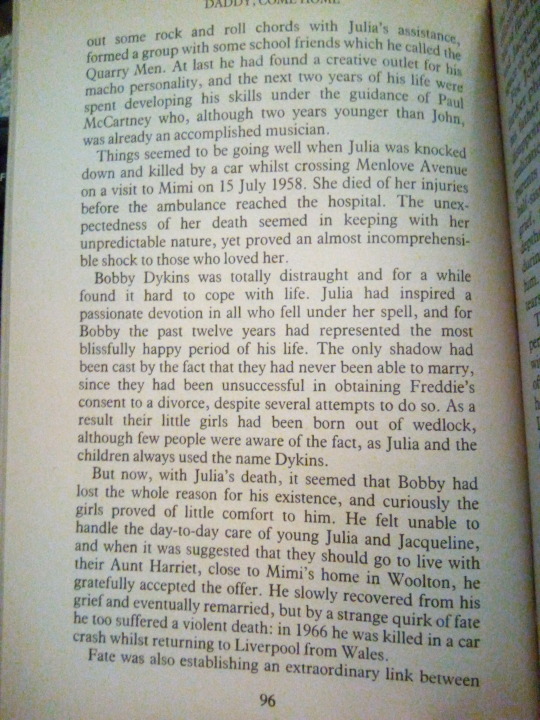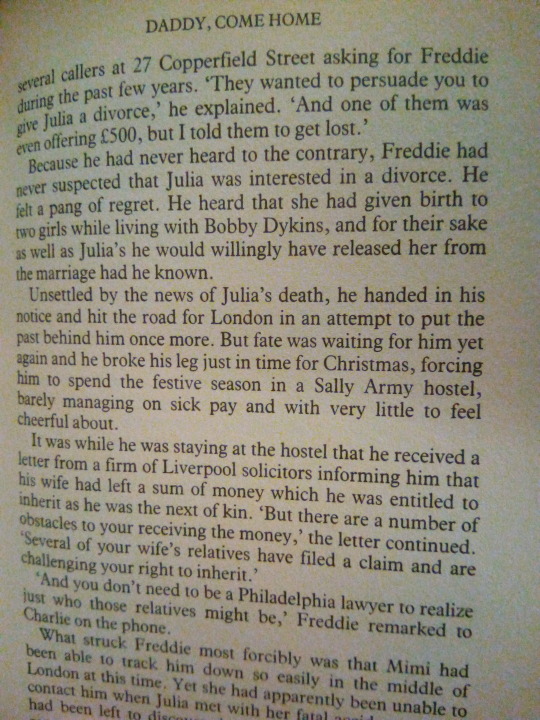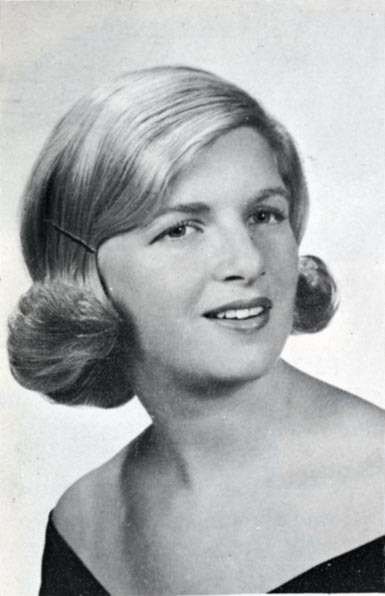Text
Bad biographies: John Lennon's parents' divorce
One of the most discussed aspects of John Lennon's story is his parents and their lack of role in his life. John's broken family had a great influence over is personality and art, most notably his well-received Plastic Ono Band solo album.
John's parents did not divorce but they separated for 12 years.
Many people find this strange. Missing from discussion online is a sense of understanding to their position. I have heard people use this as evidence of Julia (John's mother) being irresponsible or erratic. In not divorcing her first husband her second family had to deal with a lot of stigma and other issues. I believe that this is either due to it not being explained well or absent from biographies and other sources.

John and his parents, Julia and Alfred. They seperated when John was about four, he lived with his aunt but would visit his mother often.
The short answer to this is that the 1969 Divorce Reform Act and the 1973 Matrimonial Causes Act created the divorce laws we would recognise today and there were many restrictions to divorce before that time.
Due to certain specifics of their situation and the law at that time Julia needed Alf to agree to a divorce. She was also greatly restricted by her financial situation and Alf being very difficult to locate.
During the sixties Alf would remarry. His second wife Pauline Jones would adapt his memoirs into a published book: Daddy Come Home: True Story of John Lennon and His Father by Pauline Lennon


Pages 96 and 99. According to them it was Alf who was the barrier to divorce. They were aware of Julia's repeated attempts to divorce, although too late because she had died before then. Alf states that it never occurred to him that they would divorce and would have agreed had he known. He claims that his younger brother Charlie rejected the divorce on his behalf, even the offer of quite a lot of money.
You cannot take what they say at face value. Alf is writing the memoir to clear his name in the eyes of John and the public, a relationship he was trying to repair. Pauline wants to defend her husband from perceived criticism and reassure her sons that their father was a good man.
That said, they could have been defensive and blamed others but instead they present regret over what happened. The accuracy may be doubtful, but Alf is most likely to blame and regrets this.

In particular the impact on John and his family would have been the shame of John's younger sisters being born illegitimately. People cared if somebody was a bastard in those days and as a couple their relationship was considered "living in sin". It may have influenced John to marry his girlfriend when she became pregnant to protect her and the baby, a young marriage that became difficult for them both.
When Julia died her next of kin was Alf and the girls were taken in by relatives rather than their father. The couple had false birth certificates and disguised themselves as a married couple to secure housing. The stress and shame of their situation must have been difficult and likely would have impacted John.
#john lennon#the beatles#julia lennon#alfred lennon#alf#freddie#daddy come home#pauline lennon#divorce#seperation#law#family#parents#plastic ono band#mother#father
24 notes
·
View notes
Photo
A sweet friendship




“Paul is my favourite musician. He plays great and is so supportive. I have other bass players on my records too, and I say to each one of them, “You’re my second favourite bass player.”” — Ringo Starr
“It’s family. Sometimes we get pissed off at each other. I’ll want something from him and he won’t give it to me, and I’ll get pissed off. But then it passes. Brothers fight sometimes. There’s this revisionist history that it was all John and Paul. But it was four corners of a square; it wouldn’t have worked without one of the sides. Ringo was the right angle.” — Paul McCartney
1K notes
·
View notes
Text
Bad Biographies: Linda McCartney (Eastman)
I was listening to a podcast discussing the Beatles and once again an "expert" repeated the myth that Linda Eastman attended Sarah Lawrence College. In the past I have gotten annoyed when I heard biographers and journalists repeating this because they haven't done their research. If they can get this wrong, how can I believe the other things they say.
Personally, I have a memory of Linda saying that this isn't true, although admittedly I cannot remember the source. So, to hear others say it wrong gave me the impression they haven't done much research.
But now I have heard it so often, and read it in otherwise good biographies, that I realize that bad sourcing is endemic among biographers.
The biography of Linda
The mistake doesn't come from Linda McCartney - Wikipedia:
Eastman graduated from Scarsdale High School in 1959. She then attended Vermont College in Montpelier, Vermont, where she received an Associate of Arts in 1961... After graduating from Vermont College, she attended the University of Arizona and majored in fine arts while taking up nature photography as a hobby. While she was studying there, her mother was killed in the 1962 crash of American Airlines Flight 1 in Jamaica Bay, New York. She then left the University of Arizona without graduating, and married Joseph Melville See Jr. (in June 1962) Their daughter Heather was born in December 1962. They divorced in 1965, and Linda resumed using her maiden name.
Nor is the bad bio coming from Biography - LindaMcCartney.com website. Which offers a shorter version of the Wikipedia.
Nor is it coming from Sarah Lawrence College, Noted Alumni | Sarah Lawrence College. The college follows events in the careers of previous alumni such as Yoko Ono. Linda, unlike Yoko, is not mentioned at all and is not listed as an alumna.

Linda McCartney at Vermont College » Mining for Old (archive.org)
In fact, I couldn't find a source on the internet that gave the wrong details. Unless it is an obscure source that I have not thought of I assume the bad source is a book or article (or several).
Without asking them directly or scouring through many biographies that I do not own or articles I cannot access, then giving an analysis. I am just going to call it a day on finding the source. But it is strange that it is easy to fact check.
In fact, I would say from 1997 there really is no excuse for getting this wrong.
Many Years From Now
In 1997 Many Years From Now was published. The authorized biography quotes Paul (and Linda) so extensively it is often counted as an autobiography or memoir. Paul had a say over the final edit, so any factual errors are official.
Paul McCartney: Many Years From Now. | Miles (barrymiles.co.uk)
Paul and the author Barry Miles use the book to correct multiple myths they perceive as being spread. From how the book is written it seems to be a major motivation behind the book and reviewers criticized the defensive tone.
Paul McCartney: Many Years From Now book review | Miles (barrymiles.co.uk)
Here is the passage related to how Linda reacted to her mother's death...
"Linda moved to Tuscon, where she studied art and history. There is a myth that both Linda and Yoko Ono attended Sarah Lawrence, which was true of Yoko but not of Linda, whose brief academic career was at the University of Arizona. She was not exceptional academically and did not particularly enjoy it. It was an uncertain time in her life, she was mourning her mother and trying to find her place in the world."
- Barry Miles, Paul McCartney Many Years From Now, Published (My version): Vintage 1998, Chapter: The White Album, Page: 507
Other myths about Linda that persist are mentioned in the book. Such as Linda being related to Eastman-Kodak, this circulates online, and it seems to only be due to her being a photographer with the surname Eastman. But I haven't come across it like I have this rumor, I assume the McCartneys have done enough to combat it, although it may just be due to how obvious it is that her father is actually a lawyer.
There are further rumors, that she slept with various celebrities or wasn't any good as a photographer, the McCartneys seem to just ignore these and just tell the story on their own terms. When gossip is a source, it probably depends on the biographer to how much weight it is given. Being a celebrity probably amplifies this kind of behavior towards you. Perhaps this celebrity drama creation is a factor for the myth.
Although Paul was criticized for being so defensive and feeling the need to set the record straight, somehow it hasn't stopped people getting this wrong. The book is an important source for information on Paul, his background and the band. It talks extensively from Paul's (and Barry and other insider's) point of view. Most biographers and Beatle experts would have this book, it is a heavily used source.
Why is the myth still repeated so often?
Given that it isn't very difficult to fact check, why do people keep getting this wrong?
I have decided not to name and shame the biographers and Beatle authorities I have heard saying this. I wouldn't be writing this if I didn't think it was a bigger problem. It seems to be a fact that is commonly believed but not examined enough for a basic fact check. Please take my word for it that this is a problem.
What is most curious to me is that it doesn't even matter. If you do not have a source for where she went to college, then don't mention it. It has nothing to do with the Beatles as a band and reflects little on her relationship with Paul.
Motive
When I have heard it used in discussions about her on Beatle Podcasts it was in relations to:
How her and Yoko attended the same school
Perhaps implying a connection between John and Paul's lives or the women they liked. Maybe a spiritual symmetry that is romantic to authors, but ultimately pointless and unnecessary. They had children the same age, loved art and lived in New York, isn't that enough.
However, perhaps the origin for this myth was mistaking Yoko's biography for Linda's.

Yoko at Sarah Lawrence
Speaking about how Paul liked posh girls
Drawing a parallel to his fiancée Jane Asher, whom he had split with a few months before Linda moved in with him.
I'm not sure how much evidence there is of this as some of his girlfriends and wives were posh, but others weren't.
But again it isn't necessary, just say she came from a nice area with a well-off family.
I have the feeling that there is some sort of shorthand by saying she went to that school. Like it meant Linda was super elite and privileged instead of attending the state schools and ordinary colleges.
Hopefully it isn't related to her background, coming from a Jewish family, sometimes people will project stereotypes in a weird antisemitic way. I have seen people comment (anonymously in comments sections) on her Jewish background as if that is significant.
A more generous analysis would be that as fans, commentators want the Beatles to have married high class ladies because it fits their ideals. The Beatles are special and so they shouldn't marry ordinary girls. This is a bit silly but subconscious biases may have an effect on what they believe to be true.
Other than that, I just don't know. They should know better but they don't. I don't want to pile on or irritatingly correct people. It just puzzles me that this myth persists. It concerns me because, although minor, if this isn't getting fact checked what else isn't.
The Future
One day in the hopefully not distant future this post (2022) will be irrelevant because they will stop, either because fact checking gets better (the dream), or more likely, because online people will correct them and embarrass them into changing.
#linda mccartney#linda eastman#the beatles#paul mccartney#yoko ono#Sarah Lawrence#Vermont college#university of arizona#biography#biographer#many years from now#Barry Miles#fact check#rumors#rumor mill
15 notes
·
View notes
Quote
The engineers begin splicing the tapes, and Phil [Spector] asks John: “Have you heard Paul’s new album [Wild Life]?”
“No.”
“It’s really bad. Just four musicians, and it’s awful.”
“Don’t talk about it. It depresses me.”
“Don’t worry, John. ‘Imagine’ is Number One, and [‘Happy Xmas (War Is Over)’] will be Number One too. That’s all that matters.”
“No, it’s not that. It’s just that whenever anybody mentions his name, I don’t think about the music – I think about all the business crap. Don’t talk about him.”
Richard Williams, Uncut: So this is Christmas… (retrospective). (January, 1998)
273 notes
·
View notes
Quote
On August 1, 1971, George Harrison held a major charity event at Madison Square Garden. The Concert For Bangladesh – a country hit by the double disaster of war and cholera – was the first of its kind and George, Bob Dylan, Eric Clapton and Ravi Shankar were to appear. As soon as we arrived in New York everyone assumed John would join George and Ringo on stage. But he didn’t want to, for fear of being tricked into a Beatles reunion, even though Yoko was keen to take part. They bickered all day.
My phone rang in the middle of the night.
‘Get over here right away.’ It was John and I could tell that something was wrong. I hurriedly dressed and went down the hall to their suite in a hotel on Central Park. I could see that the room was a mess. Furniture was overturned and things were thrown about. John was very angry and Yoko was huddling in the background. He said he was leaving.
‘She wants to go onstage at George’s Bangladesh thing. I’m not gonna do it,’ he said. ‘If she wants to go on without me, let her. I’ll be in Paris.’ We rode out to the airport in a terrible rainstorm, John staring grimly ahead. I got him on a flight and returned to the Park Lane and Yoko. Hurt and upset she told me she was determined to go onstage without him, even though it would make George and Ringo uncomfortable and destroy ‘John and Yoko’ in the public eye. Only the following day did she relent and return to Ascot.
Dan Richter (former personal assistant of John and Yoko), The Mail on Sunday: What John & Yoko’s butler saw. (August 5th, 2012)
90 notes
·
View notes
Audio
Backlash and justification to HDYS
September 9th, 1971 (St Regis Hotel, New York): John makes a hedging case for the emotional integrity of ‘How Do You Sleep?’ and in defense brings up Paul’s supposedly obscure and Dylan-like messages to him on Ram. (Anyone is free to take guesses on how many times over John spent listening to Ram.)
SMITH: The big complaints about the song against Paul on your album, though, when I played it that night, was that you had no sense of humour.
JOHN: Well…
YOKO: I don’t think that.
SMITH: There was a lot of people that called who said, “What happened to his sense of humour? Where’s his sense of levity? Where is—”
JOHN: Don’t you think it’s— I think one of the funniest lines on that – I’m not saying – uh, I’m sure Paul will understand it, and uh—
YOKO: He will get it.
JOHN: —George does, and so do I – that that song is another thing like that letter. It’s just a moment of anger. But I just put it down on paper. And also, I’m answering Paul’s last album, which mostly because he didn’t hand out a lyric sheet, [people] don’t know what he was saying [on it]. Uh, it starts off with—
YOKO: “That was your first mistake.”
JOHN: “Too many people going underground,” “that was your first mistake…” And the first mistake bit is referring to us, and/or the others, about—
YOKO: “Underground” is definitely you, isn’t it?
JOHN: Yeah, about, uh – “you took your lucky break and broke it in two.” Now, if that doesn’t mean what it says, I don’t know what. Also, the song ends with, “we believe that we can’t be wrong.” So I wrote a rep– a reciprocal song. And I think some of the funniest lines on the album are, “The biggest thing he’d, whatever, the biggest thing he’d ever done was ‘Yesterday’”, and it was actually [Allen] Klein’s line, one line of it – “and since you’ve gone you’re just ‘Another Day’.” [laughs] I think it’s the funniest thing I’ve ever heard. I don’t think that about Paul all my life, or all the time… [pause] I was, uh – I wrote it in immediate response to when I heard his messages coming off his album, you know.
YOKO: [to Smith] Did you think it was funny?
JOHN: You mightn’t hear ‘em, but I can hear ‘em, and I know Paul.
Keep reading
134 notes
·
View notes